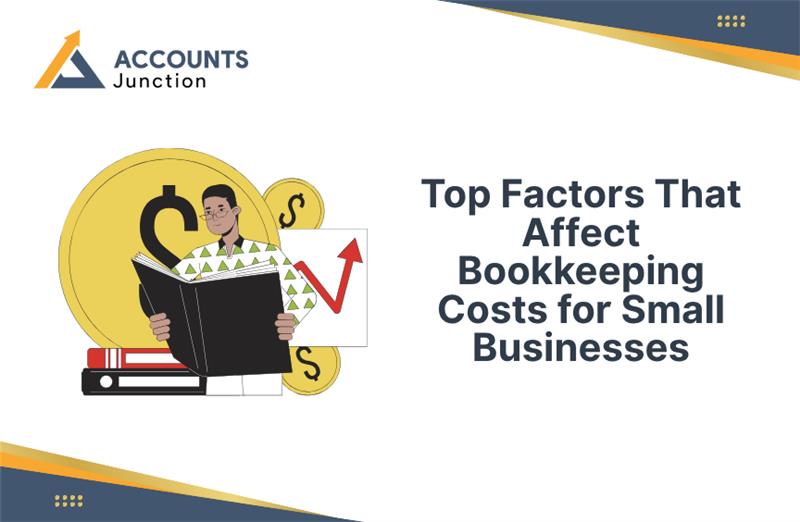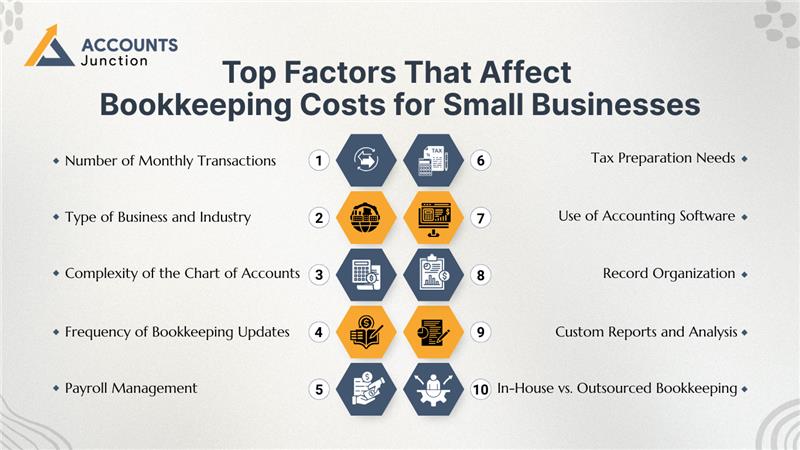
Top Factors That Affect Bookkeeping Costs for Small Businesses
If you're a small business owner, keeping your books in order is key. It’s not just about neat records, it’s about smart money choices. One of the big questions owners ask is, “What will bookkeeping cost me?” The answer is, it generally depends. Bookkeeping costs for small businesses can vary based on services used, tools applied, and how often the books are updated. Knowing these factors helps you plan better and cut waste.
Whether you do it yourself, hire a professional, or go for an outside team, it’s good to know what adds to the cost. Things like how often you record, how many sales you make, or what tools you use can raise or lower your spend. In this blog, we’ll walk you through the top things that affect bookkeeping costs for small businesses, so you can make the best choice for your needs.
1. Number of Monthly Transactions
- More transactions mean more entries.
- This adds to the bookkeeper’s work hours.
- A high volume of sales or expenses will raise the cost.
2. Type of Business and Industry
- Some industries need detailed reports and tracking.
- Examples include law firms, restaurants, and real estate.
- These special needs affect bookkeeping costs for small businesses.
3. Complexity of the Chart of Accounts
- A simple chart costs less to manage.
- A complex setup with many categories takes time.
- The more items to track, the more you’ll pay.
4. Frequency of Bookkeeping Updates
- Weekly or bi-weekly updates cost more.
- Monthly updates are more common and cheaper.
- The faster you want results, the more it may cost.
5. Payroll Management
- Payroll adds extra time and effort.
- The more employees, the more complex it becomes.
- Payroll service often raises total bookkeeping costs.
6. Tax Preparation Needs
- If your bookkeeper helps with taxes, fees will rise.
- Preparing books for a CPA or tax filing takes more work.
- This adds to the bookkeeping costs for small businesses.
7. Use of Accounting Software
- Modern software like Xero or QuickBooks makes work faster.
- If your bookkeeper uses good software, costs can go down.
- Manual bookkeeping takes longer and is more expensive.
8. Record Organization
- Clean records save time.
- Messy receipts or late entries slow down the process.
- Well-managed files can reduce your total bookkeeping cost.
9. In-House vs. Outsourced Bookkeeping
- Hiring in-house means you pay salary, benefits, and taxes.
- Outsourced bookkeeping is flexible and cheaper.
- Many small businesses outsource to reduce costs.
10. Custom Reports and Analysis
- If you want custom reports or budget planning, expect to pay more.
- Basic bookkeeping is cheaper than advisory or strategic services.
- The more tailored the work, the higher the cost.

Hire A Dedicated Team
That Grows With You, Flexible, Scalable and
Always On Your Side
Understanding Bookkeeping Costs for Small Businesses
Now that you know the main factors, here are some extra details to help you understand bookkeeping costs better.
How to Estimate Bookkeeping Costs
- For very small businesses, bookkeeping costs for small businesses may start around $200 to $400 per month.
- For mid-level businesses: $500 to $1,000 per month.
- If you need extra help, like payroll, add another $100–$300.
Ask for a flat monthly rate from your bookkeeper. It makes planning easier.
Benefits of Outsourcing Bookkeeping
Outsourcing bookkeeping helps reduce bookkeeping costs for small businesses by saving both money and time. It cuts down on overhead and helps you stay focused on what matters most, your core business.
1. Reduces Hiring and Payroll Costs
- You avoid hiring a full-time bookkeeper. No wages, bonuses, or extra HR costs to handle.
2. No Need for Training or Supervision
- Outsourced staff are skilled and ready to work. You skip the time spent on teaching or checking their work.
3. Work Is Done Right from Day One
- Experts, get your books right from the start. They follow rules and use clean systems.
4. Fixed-Price Plans for Small Businesses
- Fixed-price plans help control bookkeeping costs for small businesses with no surprise bills or hidden fees.
5. Access to Experts and Modern Tools
- You get skilled pros and smart tech. It improves speed, accuracy, and ease.
6. Flexible to Scale with Your Business
- As you grow, services grow with you. No need to hire or fire as things change.
7. Frees Up Time to Focus on Growth
- Outsourcing clears time in your day. You can focus on sales, strategy, and team.
How Bookkeeping Affects Tax Season
Good books make tax time smooth and stress-free. You save time, avoid fines, and stay in control.
1. Simplifies Tax Filing
- Your tax pro has all the data ready. This means faster returns with fewer errors.
2. Reduces Last-Minute Stress
- No rush to find old bills or match figures. Your records are already sorted and clear.
3. Avoids IRS or GST Issues
- Good books help you avoid tax risks. You stay on the right side of tax laws.
4. Prevents Penalties and Missed Deductions
- Well-kept books show all costs. You can claim more and avoid late fees.
5. Supports Faster Tax Processing
- Tax filing takes less time and effort. That gives you more time to focus on work.
6. Keeps You Ready for Audits
- If the IRS or GST asks, you’re ready. Clean records make the audit smooth and short.

How to Lower Bookkeeping Costs
With smart tools and habits, you can lower bookkeeping costs without hurting quality.
1. Use Cloud-Based Accounting Software
- Apps like Xero or QuickBooks do the hard work. They track, sort, and store data in real time.
2. Organize Receipts Weekly
- Spend 10 minutes a week on this task. It keeps your records neat and up to date.
3. Create Clear Payment Processes
- Set fixed ways to send and get money. It cuts delays, errors, and missed payments.
4. Keep Business and Personal Accounts Separate
- Never mix your funds in one place. It keeps your books clean and easy to track.
5. Track Expenses in Real-Time
- Use mobile apps to log costs daily. No need to guess later or backtrack.
6. Limit Use of Cash Transactions
- Use cards or banks when you can. They leave a trail that’s easy to record.
Why Accurate Bookkeeping Is So Important?
Good records help you stay on track, make smart moves, and build trust with banks and clients.
1. Shows True Profit or Loss
- You see the real numbers, not guesses. This helps in planning and fixing leaks.
2. Helps Manage Cash Flow
- Track what you earn and what you spend. Avoid shortfalls and plan for growth.
3. Supports Funding or Investment
- Lenders want to see clean books. It builds trust and speeds up approval.
4. Prevents Business Growth Issues
- Poor records slow down smart choices. Clean data helps you move fast and stay strong.
5. Keeps You Legally Compliant
- Tax and law rules need good records. Stay safe from fines and rule breaks.
6. Boosts Business Credibility
- Vendors and clients trust clean books. It shows you’re pro, sharp, and fair.
Cost Comparison: DIY vs. Professional Bookkeeping
|
Method |
Average Monthly Cost |
Risk Level |
Time Involved |
|
DIY Bookkeeping |
$0 – $100 (software only) |
High (error-prone) |
High |
|
In-House Bookkeeper |
$3,000 – $5,000+ (full-time) |
Low |
Low |
|
Outsourced Service |
$250 – $1,000 (part-time) |
Low to Medium |
Low to Medium |
- DIY saves money, but can lead to costly errors.
- Professionals charge more but reduce mistakes and stress.
- Outsourcing strikes a balance between quality and bookkeeping costs for small businesses, making it a smart option.
How Often Should You Review Your Bookkeeping Costs?
Review Twice a Year
- Review your bookkeeping costs for small businesses at least twice a year to stay lean and efficient. This helps catch extra spending and keeps your plan fresh. It also gives you time to adjust before tax season.
Match Services to Needs
- Only pay for what adds real value. If you're not using a service, it may be time to cut it. Review your reports to see what's worth keeping.
Use Smart Tools
- Tech can cut the time spent on tasks. Cloud apps and AI tools reduce the need for manual work. Even free tools can save money long-term.
Talk to Your Bookkeeper
- Ask about cost-saving ideas or plan changes. Bookkeepers often know ways to lower fees. It’s a smart step that many business owners miss.
Stay Aligned with Growth
- Bookkeeping costs for small businesses should scale with growth, so review them as your business expands. A plan that worked a year ago may not suit you now. Keep your system in sync with your size and pace.
Automation Saves Costs
Cut Manual Tasks
Smart tools can lower bookkeeping costs for small businesses by reducing time spent on manual data entry and checks. This keeps your records cleaner and faster.
Pull Bank Data Fast
Software links to your bank in real time. It pulls, sorts, and updates your records each day. No need to type in each line by hand.
Match Invoices Easily
Auto-matching speeds up checks and reviews. You’ll spot issues or missing entries right away. It also helps avoid paying bills twice.
Share in Real Time
Cloud apps let you and your bookkeeper see the same data. No need for long emails or Excel sheets. This saves time and keeps both sides aligned.
Boost Accuracy Too
Automation lowers human error risk. It follows rules without breaks or slips. Better books mean fewer tax or audit issues.
Many things affect bookkeeping costs for small businesses, such as how many transactions you have, how complex your reports are, and how often you need updates. The type of industry, payroll needs, and record organization also play a big role.
By understanding these factors, you can make smart choices that keep your books clean and your costs low. Whether you choose to manage it in-house or outsource it, staying organized is key.
If you're looking to outsource your bookkeeping, Accounts Junction offers accurate, affordable, and expert solutions tailored to your business. Let us help you simplify your books and save on costs.
FAQs
1. How often should small businesses do bookkeeping?
- Monthly bookkeeping is best for most small businesses.
2. Can I reduce bookkeeping costs with software?
- Yes, tools like QuickBooks or Xero save time and money.
3. Does having more employees raise bookkeeping fees?
- Yes, more employees mean complex payroll and more entries.
4. Should I hire a full-time bookkeeper?
- Only if your business is large or has complex financial needs.
5. Is outsourced bookkeeping safe?
- Yes, if done by a trusted provider with secure systems.
6. Can I combine tax filing and bookkeeping services?
- Yes, many providers offer both for better cost savings.
7. What happens if my records are disorganized?
- Bookkeepers charge more for clean-up or catch-up work.
